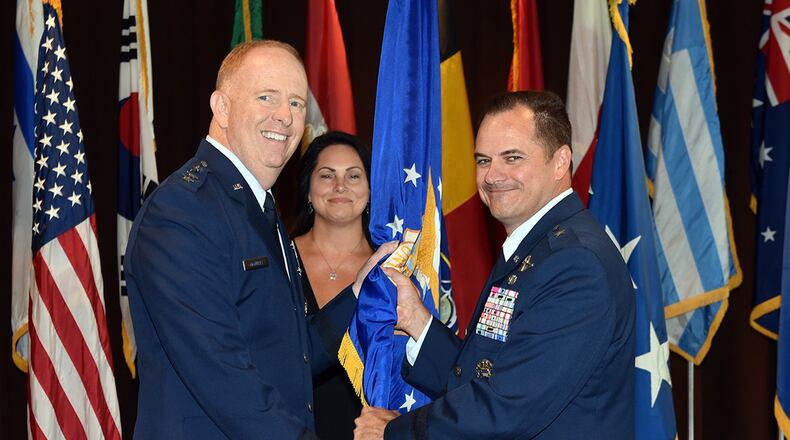“I have experienced the work of AFSAC first hand by flying missions in Bosnia and Afghanistan and commanding units in Iraq, Syria and Africa as part of a larger coalition involving many of the international partners you support,” said Farrell. “The execution and mission of AFSAC is not simple, but our objective is clear: deliver air power to our partners. The daily work of team AFSAC is critical to ensuring our nation’s security and its continuing prosperity and the security of our partners and our allies.”
As AFSAC director, Farrell will be responsible for administering a $185 billion security assistance portfolio and leading an organization charged with providing security assistance and cooperation to international partners through foreign military sales. AFSAC is comprised of eight divisions.
AFSAC supports 112 countries worldwide, eight NATO organizations and one regional organization. Every coalition partner flying missions purchases United States Air Force weapons systems and support through AFSAC.
“Because of our mission, we must hold ourselves accountable to high standards in everything we do,” said Farrell. “AFSAC will be the recognized expert in the security cooperation enterprise and we will tackle our toughest problems with innovative solutions where possible and by working harder when necessary.
Farrell joined the Air Force in 1990, receiving his commission through the ROTC program at Florida State University. His prior assignment was at Hurlburt Field, Florida, as the Air Force Special Operations Command’s director of Strategic Plans, Programs and Requirements. He has commanded at the wing, group and squadron levels.
He is a command pilot with more than 3,500 hours in the AC-130H, AC-130W, AC-130U and C-130E aircraft and has flown combat missions in Bosnia and Afghanistan.
As director of Strategic Plans, Programs and Requirements, Farrell ensured 19,000 Air Commandos worldwide were resourced and equipped through force structure planning programming, establishing requirements and acquisition program oversight through U.S. Air Force and U.S. Special Operations command processes.
“I learned a few principles along the way in my last three commands. The most fundamental for me is my Air Commandos were most happy when they had an objective in front of them, competent and loyal teammates beside them and a strong support network behind them,” Farrell said. “I found over the last couple of weeks visiting the organization that it holds true for AFSAC, and I am honored to become part of team AFSAC and look forward to working with each of you to continue the legacy of excellence.”
About the Author
